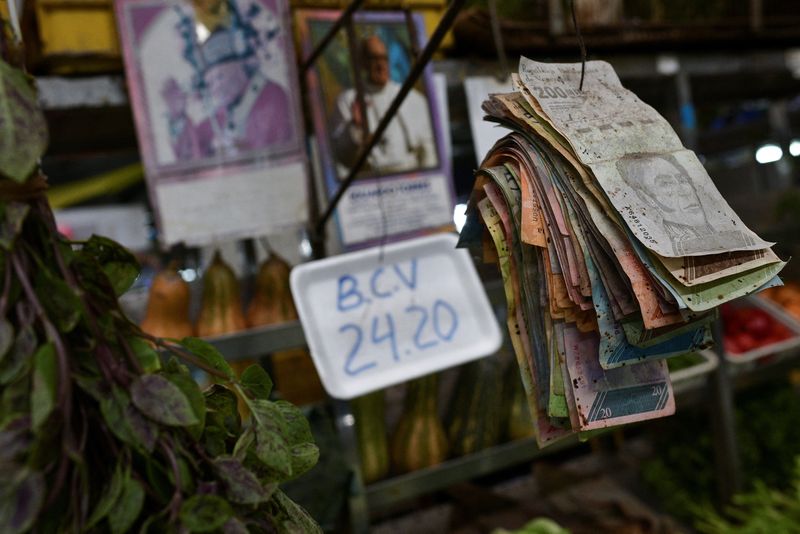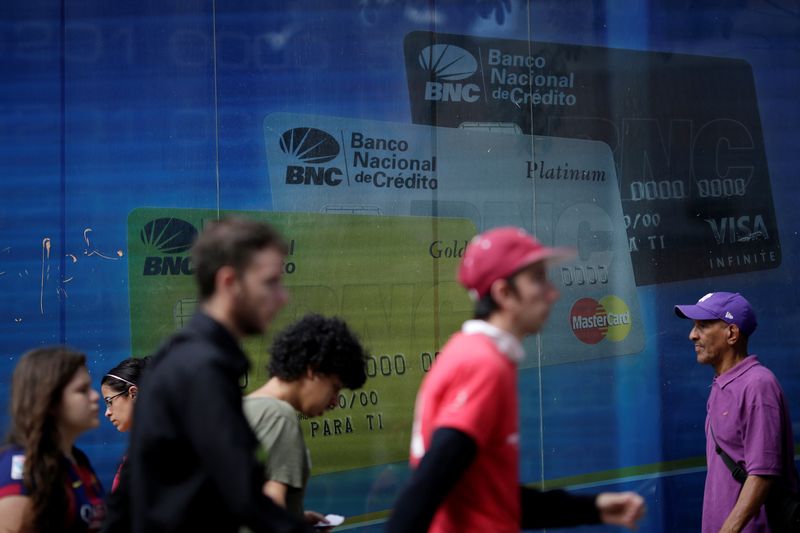By Mayela Armas
CARACAS (Reuters) - Credit cards are becoming increasingly useless in Venezuela because of high inflation and government restrictions, hurting people already struggling to meet daily needs on low salaries, banking industry sources, analysts and consumers said.
The country's government imposed strict lending requirements during Venezuela's economic collapse - allowing banks to lend a maximum of 27% of their cash flow - sending local business owners abroad to seek loans.
And though the government of President Nicolas Maduro loosened currency controls in 2019 and let local banks open dollar-denominated accounts, many credit restrictions remain.
"They are useless," administrator Lina Pereira, from the central city of Valencia, said of her two credit cards, which both have low limits. "My parents bought appliances and computers with their credit cards, but that's a memory for Venezuelans."
As incomes have fallen and living costs have grown, credit cards have become vital for many people to make everyday purchases in supermarkets and pharmacies, even as credit limits stagnate and some banks eliminate the cards altogether.
"The banks don't have a way to lend and we need these credits," 36-year-old Pereira said, adding the total limit on her cards is now $2 a month, so low she can no longer use them to buy food like she did a year ago.
Cards accounted for just 2% - equivalent to some $16 million - of the credit portfolio of Venezuelan banks at the end of December 2022, according to the country's banking superintendency.
In 2012 that figure was 12% in Venezuela, while in countries like the Dominican Republic and Bolivia credit cards currently account for 5% of banks' credit portfolios, according to those country's regulators.
"Hyperinflation and the regulations have ended consumer credit," said one Venezuelan banking executive, who asked to remain anonymous for security reasons. "This kind of financing has stopped being a business for banks. The bolivars that they can put toward credit are going to other sectors" like businesses.
Although some local credit cards have higher limits of between $30 and $100 they still fall short - the average monthly cost of feeding a family was some $370 in December, according to the independent Venezuelan Finance Observatory.
"Consumer credit is what gets punished. It's the least likely to be given out," said economist Luis Arturo Barcenas, of analyst firm Ecoanalitica. "Often these credits weren't just for buying appliances, but also for day-to-day expenses."
Maduro's government has taken multiple steps to lower inflation by increasing the supply of foreign cash, limiting credit, reducing public spending and raising taxes.
As part of those efforts, the central bank ordered financial institutions to freeze 73% of deposits at the bank.
"If there aren't sufficient resources you can't give that much credit," said another bank executive.
Despite the measures, prices ticked up at the end of 2022, taking annual inflation to 234%.
In January Maduro urged banks to give businesses loans indexed to the exchange rate so they can "produce goods, riches" but he did not mention other loans or consumer credit.

Neither the central bank nor the banking regulator responded to requests for comment.
"With the limit on cards you can't even pay for lunch," said Gregorio Afonso, a 53-year-old university professor who has two local credit cards and an income of $20 monthly. "We've been in free fall since 2013 without credit, without social protection and working multiple jobs."
